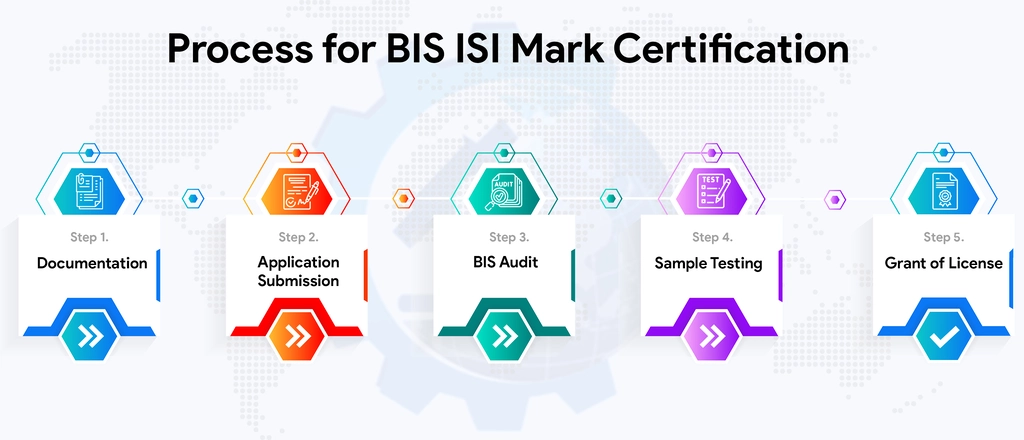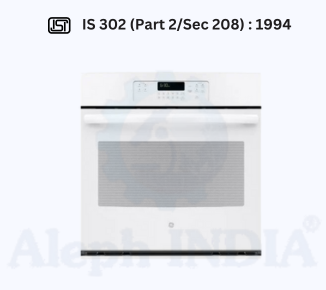BIS CERTIFICATION for Safety of household and similar electrical appliances: Part 2 particular requirements: Sec 208 single walled baking ovens IS 302 (Part 2/Sec 208) : 1994 & IS 302 Part 1
Published Date: October 09, 2024
Introduction
IS 302 (Part 2/Sec 208) and IS 302 Part 1 both are Indian Standards for requirements of single-walled baking ovens intended to be used in dwellings and similar establishments by BIS Certification. They are commonly used for baking and general cooking purposes. This has increased demand and it is a big market. Their security compliance instills confidence among consumers, making imports and exports easier.
To sell in India, manufacturers require BIS certification and assurance of a quality and safe product for consumers. Even the guarantee of ISI will have to exist to satisfy customers. Know the fees to get BIS clearance, the QCO order, and BIS customs clearance. This is the gateway to successful business operations in India's appliance market.
Overview
IS 302 (Part 2/Sec 208): 1994 GIVES SPECIFICATION FOR SINGLE WALLED, OVEN TYPE, DOMESTIC USE. The standard assures that they are not dangerous in hazardous conditions at any stage during baking and, in particular, there is no electrical safety risk. The standard applies to single-phased ovens that operate at a maximum of 230 volts. The current specification does not apply to double-walled ovens or ovens intended for use in mobile vehicles or ships. The oven shall be capable of reaching a baking temperature of at least 250°C. BIS certification will be given only if the manufacturers follow the existing standard.
Key highlights
| Product Name | Safety of household and similar electrical appliances: Part 2 particular requirements: Sec 208 single walled baking ovens |
| Applicable Indian Standard | IS 302 (Part 2/Sec 208) : 1994 & IS 302 Part 1 (for General Requirements) |
| Import Regulations & Applicable Certification Scheme: | Product Certification Scheme (ISI Mark Scheme) Scheme 1 |
| Applicable Mark: | BIS Standard Mark (ISI Logo) |
| Compliance Requirement | Mandatory |
| Quality Control Order | Click here |
| Ministry | Ministry of Commerce and Industry |
| Scope as per Standard | This standard covers general and safety requirements for Single Walled Baking Ovens for baking and grilling designed for household use, their rated voltage not exceeding 230 volts ac single phase or dc. This standard does not apply to: - Double walled cooking ovens and other ovens which are covered by IS 302-2-6 (1993). For appliances intended to be used in vehicles or on board ships or aircraft, additional requirements may be necessary. |
| Major Country of Import | Primarily imported from countries such as China, Germany, and Italy |
Applicable Tests for Safety of household and similar electrical appliances: Part 2 particular requirements: Sec 208 single walled baking ovens IS 302 (Part 2/Sec 208) : 1994 & IS 302 Part 1
Mandatory Tests:
- Rating
- Classifications
- Marking
- Protection against access to live parts
- Starting Of Motor-Operated Appliances
- Power Input and Current
Optional Tests:
- Transient over voltages
- Overload protection of transformers and associated circuits
- Endurance
- Abnormal operation

Note
For Detailed Information about the Procedure for BIS ISI Certification, Visit :
Timeline for BIS Certification
The approximate timeline to obtain BIS certification for Safety of household and similar electrical appliances: Part 2 particular requirements: Sec 208 single walled baking ovens IS 302 (Part 2/Sec 208) : 1994 & IS 302 Part 1 as follows:
- For Indian Manufacturers (Standard Timeframe – 30 days)
- For Foreign Manufacturers (Standard Timeframe – 180 days)
Benefits of BIS Certification
BIS certification enhances product credibility, boosts consumer trust, expands market access, and provides a competitive edge for manufacturers. :
| Benefit | Description |
|---|---|
| Access to the Indian Market | BIS certification is often a prerequisite for selling products in India, facilitating easier entry into a vast and growing market. |
| Compliance with Indian Standards | Ensures that products meet established safety and performance benchmarks, aligning with national regulations and standards. |
| Enhanced Product Credibility | The BIS mark signifies that a product has undergone rigorous testing, enhancing its credibility and reputation in the eyes of consumers and retailers. |
| Increased Customer Trust | Consumers are more likely to choose certified products, knowing they adhere to safety and quality standards, which boosts overall customer satisfaction. |
| Benefits for MSMEs | Small and medium enterprises gain a competitive edge by obtaining BIS certification, as it opens up opportunities for government contracts and partnerships. |
Conclusion
BIS certification is a strategic asset that fosters quality assurance and market growth for businesses in India. ALEPH INDIA assists manufacturers in achieving this crucial verification
Aleph INDIA has been serving the industry as a single-window operator for all product regulatory compliance. We can assist importers or manufacturers in meeting all criteria for importing or selling a product in the Indian market.
Frequently Asked Questions
International Audits & Participation
Testimonials
BIS REGISTRATION FOR ELECTRONIC & IT PRODUCT
In the era of globalization, world trade is growing rapidly and henceforth, Manufacturing and Import/Export businesses are also growing drastically...View More
BIS CERTIFICATE FOR FOREIGN MANUFACTURER
The Economy of India-the fastest developing economy on the globe with the capabilities that help it matches up with the biggest international...View More
PRODUCT CERTIFICATION SCHEME (ISI MARK) FOR DOMESTIC MANUFACTURERS
Anything a person buys from food to cars, clothes to electronics, branded to unnamed products there is always a question that wanders in one’s...View More
WIRELESS PLANNING AND COORDINATION (WPC)
WPC: Wireless means communication done from one point to another point without the wires and cables. Electromagnetic waves carry the ...View More
BUREAU OF ENERGY EFFICIENCY (BEE) CERTIFICATE
BEE CERTIFICATE: Energy is the future, and its conservation is the way of the bright future. Everyone claims the environment is important...View More
E-WASTE MANAGEMENT
E-waste is one of the world's fastest-growing trash streams. We currently manufacture almost 50 million tones of it each year...View More
View All Services
Request a call back.
Would you like to speak to one of our Senior Technical advisers over the phone? Just submit your details and we’ll be in touch shortly. You can also email us if you would prefer.






























